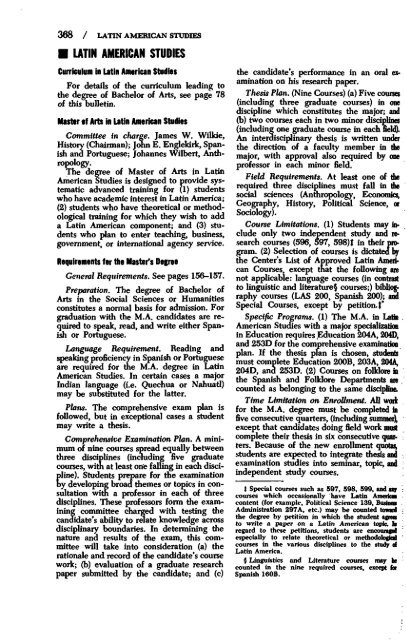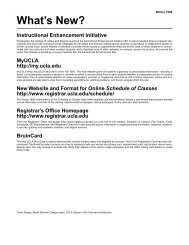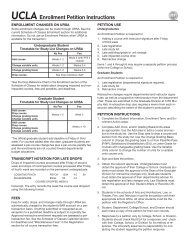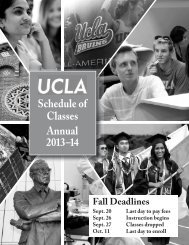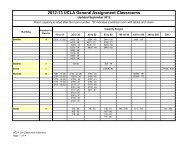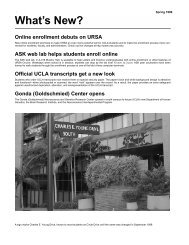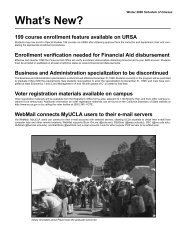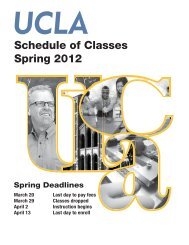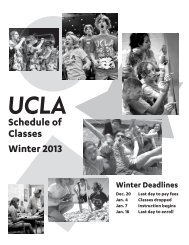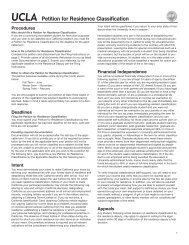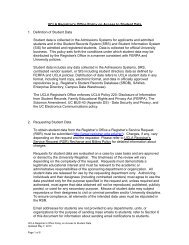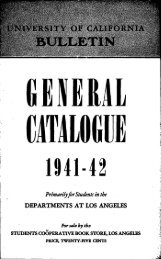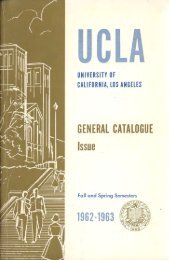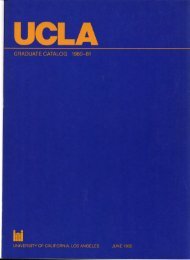- Page 1 and 2:
UCLA ,'GENERAL CATALOG 1971 -1972 I
- Page 3 and 4:
UCLA GENERAL CATALOG 1971-1972ISSUE
- Page 5:
Contents CALENDAR . . . . . . . . .
- Page 8 and 9:
6 / CALENDAR Fall 71 Wiatsr'72 Spri
- Page 10 and 11:
8 / SURVEY OF CURRICULA as a Teache
- Page 12 and 13:
10 / SPECIAL RESEARCH FACILITIES Ch
- Page 14 and 15:
12 / SPECIAL RESEARCH FACQATIES whi
- Page 16 and 17:
14 / SPECIAL RESEARCH FACILITIES Al
- Page 18 and 19:
16 / SPECIAL RESEARCH FACILITIES ed
- Page 20 and 21:
18 / SPECIAL RESEARCH FACILITIES sh
- Page 22 and 23:
20 / LECTURES , CONCERTS , EXHIBITS
- Page 24:
22 / EDUCATION ABROAD; SUMMER SESSI
- Page 27 and 28:
Admission to the University IN UNDE
- Page 29 and 30:
REQUIREMENTS FOR ADMISSION / 27 to
- Page 31 and 32:
SPECIAL REQUIREMENTS FOR NONRESIDEN
- Page 33 and 34:
IN GRADUATE STATUS / 31 with the Ed
- Page 35 and 36:
IN GRADUATE STATUS / 33 States. The
- Page 37 and 38:
General Regulations READMISSION A s
- Page 39 and 40:
REGISTRATION AND ENROLLMENT / 37 Th
- Page 41 and 42:
sCHO tsstr MQvmEMENrrs / 39 complet
- Page 43 and 44:
FINAL EXAMINATIONS; DEGREE RWuIREME
- Page 45 and 46:
CHANGE OF COLLEGE OR MAJOR / 43 174
- Page 47 and 48:
GENERAL EXPENSES AND FEES* Expenses
- Page 49 and 50:
onmat FEES / 47 REFIMID OF FEES Par
- Page 51 and 52:
FINANCIAL AIDS FOR STUDENTS FINANCI
- Page 53 and 54:
FINANCIAL AIDS / 51 available from
- Page 55 and 56:
LIVING ACCOMMODATIONS / 53 hours a
- Page 57 and 58:
TRANSPORTATION AND PARKING / 55 PRI
- Page 59 and 60:
STUDENT HEALTH SERVICE Student Serv
- Page 61 and 62:
MEDICAL CARE; COUNSELING / 59 care,
- Page 63 and 64:
ROTC ; SPECIAL SERVICES / 61 of suc
- Page 65 and 66:
THE ASSOCIATED STUDENTS ASSOCIATED
- Page 67 and 68:
PHYSICAL EDUCATION ; PLACEMENT SERV
- Page 69 and 70:
COLLEGE OF LETTERS AND SCIENCE Coll
- Page 71 and 72:
COLLEGE of LETTERS AND SCIENCE / 69
- Page 73 and 74:
COLLEGE OF LETTERS AND SCIENCE / 71
- Page 75 and 76:
COLLEGE of LETTERS AND sci is / 73
- Page 77 and 78:
COLS EGE OF LETTERS AND SCIENCE / 7
- Page 79 and 80:
COLLEGE of LETTERS AND SCIENCE / 77
- Page 81 and 82:
COLLEGE of LETrERS AND SC ENCE / 79
- Page 83 and 84:
COLLEGE OF LETTERS AND SCIENCE / 81
- Page 85 and 86:
COLLEGE OF LETTERS AND SCIENCE / 83
- Page 87 and 88:
COLLEGE OF LETTERS AND SCIENCE / 85
- Page 89 and 90:
COLLEGE OF LETTERS AND SCIENCE / 87
- Page 91 and 92:
COLLEGE OF LETTERS AND SCIENCE / 89
- Page 93 and 94:
Older Professional Curricula in the
- Page 95 and 96:
COLLEGE OF FINE ARTS / 93 Eastern L
- Page 97 and 98:
COLLEGE OF FINE ARTS / 95 The cours
- Page 99 and 100:
COLLEGE OF FINE ARTS / 97 per unit
- Page 101 and 102:
SCHOOL OF ARCHITECTURE AND URBAN PL
- Page 103 and 104:
SCHOOL OF ARCHITECTURE AND URBAN PL
- Page 105 and 106:
SCHOOL OF ARCHITECTURE AND URBAN PL
- Page 107 and 108:
SCHOOL OF ARCHITECTURE AND URBAN PL
- Page 109 and 110:
GRADUATE SCHOOL OF BUSINESS ADMINIS
- Page 111 and 112:
GRADUATE SCHOOL OF BUSINESS ADMINIS
- Page 113 and 114:
GRADUATE SCHOOL OF BUSINESS ADMINIS
- Page 115 and 116:
GRADUATE SCHOOL OF BUSINESS ADMINIS
- Page 117 and 118:
7 SCHOOL OF DENTISTRY ; GRADUATE SC
- Page 119 and 120:
University Elementary School GRADUA
- Page 121 and 122:
GRADUATE SCHOOL OF EDUCATION / 119
- Page 123 and 124:
GRADUATE SCHOOL OF EDUCATION / 121
- Page 125 and 126:
GRADUATE SCHOOL OF EDUCATION / ] or
- Page 127 and 128:
GRADUATE SCHOOL OF EDUCATION / 125
- Page 129 and 130:
Admission Requirements SCHOOL OF EN
- Page 131 and 132:
SCHOOL OF ENGINEERING AND APPLIED S
- Page 133 and 134:
SCHOOL OF ENGINEERING AND APPLIED S
- Page 135 and 136:
SCHOOL OF ENGINEERING AND APPLIED S
- Page 137 and 138:
SCHOOL OF ENGINEERING AND APPLIED S
- Page 139 and 140:
SCHOOL OF ENGINEERING AND APPLIED S
- Page 141 and 142:
SCHOOL OF ENGINEERING AND APPLIED S
- Page 143 and 144:
SCHOOL of LAw / 141 readiness for t
- Page 145 and 146:
SCHOOL OF LIBRARY SERVICE ; SCHOOL
- Page 147 and 148:
SCHOOL OF NURSING / 145 PHYSICAL EX
- Page 149 and 150:
SCHOOL of NURSING / 147 Application
- Page 151 and 152:
SCHOOL OF PUBLIC HEALTH / 149 catio
- Page 153 and 154:
SCHOOL OF PUBLIC HEALTH / 151 serie
- Page 155 and 156:
SCHOOL OF SOCIAL WELFARE / 153 prio
- Page 157 and 158:
THE GRADUATE DIVISION THE GRADUATE
- Page 159 and 160:
THE GRADUATE DIVISION / 157 ards ar
- Page 161 and 162:
THE GRADUATE DIVISION / 159 by a co
- Page 163 and 164:
THE GRADUATE DIVISION / 161 he comp
- Page 165 and 166:
Courses of Instruction CLASSIFICATI
- Page 167 and 168:
AEROSPACE STUDIES / 165 AEROSPACE S
- Page 169 and 170:
program requires between one and tw
- Page 171 and 172:
250L North African Studies. 271. Se
- Page 173 and 174:
ANATOMY / 171 Raymond J. Last , F.R
- Page 175 and 176:
ANTHROPOLOGY / 173 253. Problems in
- Page 177 and 178:
ANTHROPOLOGY / 175 pervise the stud
- Page 179 and 180:
ANTHROPOLOGY / 177 122A. Comparativ
- Page 181 and 182:
Ill. Spec Studies in Anthropology.
- Page 183 and 184:
XL Optimization Theory. (Formerly n
- Page 185 and 186:
ARCHITECTURE AND URBAN PLANNING / 1
- Page 187 and 188:
sesearch reports , one of which cou
- Page 189 and 190:
pedestrian circulation, community s
- Page 191 and 192:
ART / 189 It is recommended that ea
- Page 193 and 194:
1110. Egyptian Art and Archeology.
- Page 195 and 196:
147. Photography. Studio, eight hou
- Page 197 and 198:
ASTRONOMY / 195 Adrising Requiremen
- Page 199 and 200:
Credit toward the M.A. in astronomy
- Page 201 and 202:
model and other aspects of regulato
- Page 203 and 204:
BIOLOGICAL CHEMISTRY / 201 Concurre
- Page 205 and 206:
this examination will be announced
- Page 207 and 208:
BOTANICAL sci cEs / 205 Arthur w .
- Page 209 and 210:
meat of ecological concepts . Princ
- Page 211 and 212:
BUSINESS ADMINISTRATION / 209 Keith
- Page 213 and 214:
BUSINESS ADMINISTRATION / 211 Hari.
- Page 215 and 216:
BUSINESS ADMINISTRATION / 213 2050.
- Page 217 and 218:
tenproblems ; of accounting for int
- Page 219 and 220:
Mt . Scheduling Theory. Prerequisit
- Page 221 and 222:
2161. Housing Economics. Prerequisi
- Page 223 and 224:
OPERATIONS RESEARCH See courses 111
- Page 225 and 226:
CHEMISTRY / 223 breadth requirement
- Page 227 and 228:
CHEmisTRY / 225 course chosen from
- Page 229 and 230:
CHEMISTRY / 227 registration. Stude
- Page 231 and 232:
CHEMISTRY / 229 184. Advanced Analy
- Page 233 and 234:
CLASSICS / 231 W. Preparation for t
- Page 235 and 236:
CLASSICS / 233 first year of reside
- Page 237 and 238:
12. Advanced Modem Greek. 122. Plat
- Page 239 and 240:
CLASSICS / 237 114. Roman Epistolog
- Page 241 and 242:
CLASSICS / 239 Lion in European and
- Page 243 and 244:
M250A- 250B. Seminar in European Ar
- Page 245 and 246:
COMPARATIVE LITERATURE / 243 Ross P
- Page 247 and 248:
COMPUTER SCIENCES Studies related t
- Page 249 and 250:
hpirements for the Master's Degree
- Page 251 and 252:
DANCE / 249 IRA-1588. Philosophical
- Page 253 and 254:
ECONOMICS / 251 Objective of the Ma
- Page 255 and 256:
ECONOMICS / 253 105. Introduction t
- Page 257 and 258:
201 B. Theory of Production and Dis
- Page 259 and 260:
EDUCATION / 257 Simon Gonzalez , Ed
- Page 261 and 262:
EDUCATION / 259 station and public
- Page 263 and 264:
EDUCATION / 261 2288. Psychosocial
- Page 265 and 266:
EDUCATION / 03 261F. Higher Educati
- Page 267 and 268:
EDUCATION / 265 in social studies c
- Page 269 and 270:
ENGINEERING AND APPLIED SCIENCE / 2
- Page 271 and 272:
ENGINEERING AND APPLIED SCIENCE / 2
- Page 273 and 274:
2$. Programming and Problem Solving
- Page 275 and 276:
vices. Device-circuit -environment
- Page 277 and 278:
133A. Propulsion. Prerequisite: cou
- Page 279 and 280:
157A . (Lecture , four hours.) Theo
- Page 281 and 282:
1958. Soil Mechanics-Laboratory Pra
- Page 283 and 284:
ENGINEERING AND APPLIED SCIENCE / 2
- Page 285 and 286:
ENGINEERING AND APPLIED SCIENCE ; E
- Page 287 and 288:
ENGINEERING AND APPLIED SCIENCE / 2
- Page 289 and 290:
M. Advanced Dynamics. Prerequisite
- Page 291 and 292:
ENGINEERING AND APPLIED SCIENCE / 2
- Page 293 and 294:
foal extraction. A study of process
- Page 295 and 296:
John Jenkins Espey, B.Litt., M.A.,
- Page 297 and 298:
Special Programs The Department off
- Page 299 and 300:
ENGLISH / 297 second language at le
- Page 301 and 302:
ENGLISH / 299 and social condition
- Page 303 and 304:
211. Readings in Old English Litera
- Page 305 and 306:
Courses in English as a Second Lang
- Page 307 and 308:
FOLKLORE AND MYTHOLOGY GROUP / 305
- Page 309 and 310:
FOLKLORE AND MYTHOLOGY GROUP / 307
- Page 311 and 312:
213. Folk Belief and Custom. Prereq
- Page 313 and 314:
FOREIGN LITERATURE IN TRANSLATION ;
- Page 315 and 316:
legs of Letters and Science, be exc
- Page 317 and 318:
X. Elementary French for Graduate S
- Page 319 and 320: 218A 216H. The Renaissance. 218A. T
- Page 321 and 322: GEOGRAPHY (Department Office, 1255
- Page 323 and 324: committee . The topic will be assig
- Page 325 and 326: sloe standing . The principles of p
- Page 327 and 328: 214. Advanced Climatology. Lecture,
- Page 329 and 330: GEOLOGY / 327 Individual Study and
- Page 331 and 332: nature and interpretation of geolog
- Page 333 and 334: GEOLOGY / 331 admitted with consent
- Page 335 and 336: GEOPHYSICS AND PLANETARY PHYSICS /
- Page 337 and 338: David R. McCann, Ph.D., Assistant P
- Page 339 and 340: 3. Elementary Berman. Lecture, five
- Page 341 and 342: 207A. Classicism : Goethe. Selected
- Page 343 and 344: GERMANIC LANGUAGES / 341 3. Element
- Page 345 and 346: HISTORY / 343 Eugen Weber , M.Litt
- Page 347 and 348: HISTORY / 345 Admission to Graduate
- Page 349 and 350: HISTORY / 347 witted to candidacy a
- Page 351 and 352: HISTORY / 349 113A-113B . History o
- Page 353 and 354: HISTORY / 351 IN. The Mexican Revol
- Page 355 and 356: HISTORY / 353 70MA -2098. The Moder
- Page 357 and 358: W. Directed Studies for Graduate Ex
- Page 359 and 360: D. A. Wilson, Political Science ; C
- Page 361 and 362: 104B-104C-104D. Architecture and th
- Page 363 and 364: Near Eastern Languages 200. Bibliog
- Page 365 and 366: ITALIAN / 363 6. The Dissertation .
- Page 367 and 368: Individual Study and Research IN. D
- Page 369: Graduate Courses 201. Structure of
- Page 373 and 374: M250C . Latin American Education la
- Page 375 and 376: G. Edward Evans, Ph.D., Assistant P
- Page 377 and 378: Professional Courses 400. Introduct
- Page 379 and 380: LINGUISTICS LINGUISTICS / 377 (Offi
- Page 381 and 382: LINGUISTICS / 379 Courses 103, M110
- Page 383 and 384: General linguistics tower Division
- Page 385 and 386: 0225P . Chinese. 225K. English Phon
- Page 387 and 388: Related Courses in Other Department
- Page 389 and 390: MATHEMATICS / 387 Ronald Miech, Ph.
- Page 391 and 392: Monday of registration week. Depart
- Page 393 and 394: minor who is not majoring in one of
- Page 395 and 396: 213A-2131. Theory of Groups. Prereq
- Page 397 and 398: 270A -270B. Approximation Theory. P
- Page 399 and 400: MEDICAL HISTORY / 397 dissertation.
- Page 401 and 402: Admissln to Graduate Status For adm
- Page 403 and 404: METEOROLOGY / 401 Requirements fir
- Page 405 and 406: ?METEOROLOGY / 403 *212B. Numerical
- Page 407 and 408: MILITARY SCIENCE (Department Office
- Page 409 and 410: the six weeks of camp is not grante
- Page 411 and 412: The Phi. Program A program of study
- Page 413 and 414: Paul S. Chihara, A.M.D., Associate
- Page 415 and 416: ganizations. Recommended : 101,110A
- Page 417 and 418: Th" In historical musicology, ethno
- Page 419 and 420: music / 417 710-70S. Performance Or
- Page 421 and 422:
music / 419 139. History and Litera
- Page 423 and 424:
music / 421 210. Medieval Notation.
- Page 425 and 426:
NAVAL SCIENCE / 423 month for a max
- Page 427 and 428:
Bscheior of Art Degree The degree i
- Page 429 and 430:
Related Courses in Other Department
- Page 431 and 432:
Berber Upper Division Courses i1O1A
- Page 433 and 434:
§190A-1906 - 190C. Introduction to
- Page 435 and 436:
NEUROSCIENCE ; NURSING / 433 NEUROS
- Page 437 and 438:
MBISTERED NURSES Nparation for the
- Page 439 and 440:
475. Suporvisien of Nursing Service
- Page 441 and 442:
legoirements for the Ph.D. Degree 1
- Page 443 and 444:
ORIENTAL LANGUAGES / 441 170C. Surv
- Page 445 and 446:
Gen Niwayama, M.D., Assistant Profe
- Page 447 and 448:
Z1411 -23411-234C . Experimental Me
- Page 449 and 450:
terminal degree . The Department wi
- Page 451 and 452:
GROUP III 150A-150B . Society and M
- Page 453 and 454:
PHYSICAL EDUCATION / 451 212. Semin
- Page 455 and 456:
PHYSICAL EDUCATION / 453 Admission
- Page 457 and 458:
PHYSICAL SCIENCES M. Physics. (Same
- Page 459 and 460:
Charles D. Buchanan , Ph.D., Adjunc
- Page 461 and 462:
ments into other programs. The stud
- Page 463 and 464:
1158. Elementary Quantum Mechanics.
- Page 465 and 466:
M. Seminar in Propagation of Waves
- Page 467 and 468:
(mandatory) administered by the stu
- Page 469 and 470:
PLANETARY AND SPACE SCIENCE / 467 F
- Page 471 and 472:
225A. Physics and Chemistry of Plan
- Page 473 and 474:
POLITICAL SCIENCE }Andrzej Korbonsk
- Page 475 and 476:
the "write-off," field requirement
- Page 477 and 478:
student will be awarded a C.Phil. d
- Page 479 and 480:
POLITICAL SCIENCE / 477 130. New St
- Page 481 and 482:
174. Government and Labor. This cou
- Page 483 and 484:
POLITICAL SCIENCE / 481 225. Studie
- Page 485 and 486:
PSYCHIATRY / 483 George Tarjan, M.D
- Page 487 and 488:
PSYCHIATRY / 485 Roland C. Summit,
- Page 489 and 490:
PSYCHOLOGY / 487 Andrew L. Comrey,
- Page 491 and 492:
PSYCHOLOGY / 489 Charles D. McCarth
- Page 493 and 494:
PSYCHOLOGY / 491 assistants or trai
- Page 495 and 496:
PSYCHOLOGY / 493 134. Educational P
- Page 497 and 498:
211. Perception. Basic experiments
- Page 499 and 500:
278A-278B. Seminar in Motivation, C
- Page 501 and 502:
PUBLIC HEALTH / 499 Olive Jean Dunn
- Page 503 and 504:
PUBLIC HEALTH / 501 Allen W. Mathie
- Page 505 and 506:
PUBLIC HEALTH / 503 154. Economics
- Page 507 and 508:
PUBLIC HEALTH / 505 241A-2418. Line
- Page 509 and 510:
PUBLIC HEALTH / 507 284. Seminar in
- Page 511 and 512:
471. Environmental Health Control.
- Page 513 and 514:
J. Edson Price, M.D., Instructor of
- Page 515 and 516:
adioactivity, ir teractions of nucl
- Page 517 and 518:
Introduction to Romanistics: (Spani
- Page 519 and 520:
permission of the instructor and th
- Page 521 and 522:
Individual Study and Research 597.
- Page 523 and 524:
160. Polish Romanticism. Three bons
- Page 525 and 526:
SOCIAL WELFARE / 523 221A. Social W
- Page 527 and 528:
Robert M. Emerson, Ph.D., Assistant
- Page 529 and 530:
125. Urban Sociology. Urban and rur
- Page 531 and 532:
construction ; interviewing and dat
- Page 533 and 534:
SPANISH AND PORTUGUESE / 531 Anibal
- Page 535 and 536:
3. Elementary Spanish. Meets six ho
- Page 537 and 538:
227. Cervantes. Meets three hours w
- Page 539 and 540:
Requirements: a reading knowledge o
- Page 541 and 542:
SPEECH / 539 597. Preparation for G
- Page 543 and 544:
1. Principles of Oral Communication
- Page 545 and 546:
238. Theory of Delivery. A historic
- Page 547 and 548:
j I Carl R. Mueller, Ph.D., Assista
- Page 549 and 550:
THEATER ARTS / 547 preparation is d
- Page 551 and 552:
117B. The Puppet Theater . (th cour
- Page 553 and 554:
NOTION PICTURE / TELEVISION AREAS 1
- Page 555 and 556:
Laboratory, four hours plus additio
- Page 557 and 558:
275B. Seminar in Television Documen
- Page 559 and 560:
zooLocc / 557 598. M.A. Thesis in T
- Page 561 and 562:
ZOOLOGY / 559 Graduate Study Requir
- Page 563 and 564:
ZOOLOGY / 561 143. Comparative Phys
- Page 565 and 566:
226. Advanced Insect Physiology. Le
- Page 567 and 568:
REGENTS EX OFFICIO* Ronald Reagan G
- Page 569 and 570:
V. Burt Cowman, Physical Plant Admi
- Page 571 and 572:
A Academic Residence, definition of
- Page 573 and 574:
Economics , 250, 543 Education Abro
- Page 575 and 576:
Hausa, 384 Hebrew, 429 Hindi, 384 H
- Page 577 and 578:
Readmission, 35, 153 Recreation Ser


